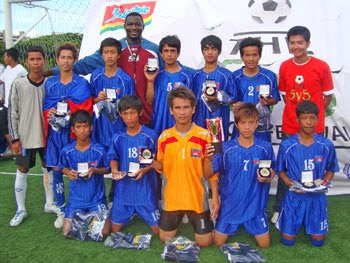(CAAI News Media)
Monday, 21 December 2009 15:03 Sebastian Strangio
HUMAN rights activists have lashed out at the government’s deportation of 20 Uighur asylum seekers to China on Saturday, claiming it has committed a “grave breach” of international law under pressure from Beijing.
Interior Ministry spokesman Khieu Sopheak said that 20 Uighurs departed Phnom Penh International Airport at 9pm on Saturday aboard a chartered flight bound for an undisclosed destination in China.
Koy Kuong, spokesman for the Ministry of Foreign Affairs, said earlier that the Uighurs were being deported after entering the country illegally, without passports or visas.
“We are using the Immigration Law to deport them because they are illegal immigrants,” he said. “We have not specifically targeted these people – we do this in general for all foreign nationals who enter Cambodia illegally.”
Last week, Koy Kuong said the Uighurs were being interviewed by the UN High Commissioner for Refugees (UNHCR) with government assistance in order to assess their status.
A total of 22 Uighurs, from China’s restive northwest Xinjiang province, arrived in Cambodia at various points last month and applied for political asylum through UNHCR.
Uighur rights groups have said the group, which includes three children, fled China after witnessing clashes between Chinese security forces and Uighur demonstrators in Urumqi, Xinjiang’s capital, in July.
Rights activists familiar with the case said the 20 Uighurs were rounded up on Wednesday and transported in
UNHCR vehicles with Cambodian police escort to a site under joint government-UNHCR administration. On Friday night, the Uighurs were forced at gunpoint to board Cambodian police vehicles and transferred to the National Police Headquarters before being flown out of Phnom Penh on Saturday, one activist said.
Kitty McKinsey, Asia spokeswoman for UNHCR, said the agency lodged formal protests with the government on Saturday, expressing deep concerns about the deportation.
“We are deeply distressed about the forced deportation of the ethnic Uighurs to China, especially because no assessment had been made of whether they were in need of international protection,” she said.
Rights advocates also criticised the sudden deportation, which some put down to escalating Chinese pressure ahead of the visit of Vice President Xi Jinping, who was expected to arrive in Cambodia on Sunday for a three-day visit.
“We are particularly disturbed that these Uighurs were re-fouled prior to the completion of their asylum interview process, which Cambodian authorities had previously agreed to cooperate with,” said Amy Reger, a researcher at the US-based Uighur Human Rights Project.
“By taking this action, Cambodian authorities have shown blatant disregard for its international human rights obligations, undoubtedly due to Chinese government pressure.” She added that the Uighurs now faced “possible execution, torture and lengthy imprisonment” by Chinese authorities.
Brittis Edman, a researcher for Amnesty International, said the government appeared to treat the Uighurs as “commodities” in its dealings with China, in open disregard of its obligations under the 1951 Refugee Convention. “Deporting them late at night, and on the weekend, doesn’t exactly improve the [government’s] track record,” she said.
Ou Virak, president of the Cambodian Centre for Human Rights, said that the abrupt deportation was clearly linked to the arrival of the Chinese delegation and a Cambodian desire to show “good will” towards its powerful patron.
“This is why the Cambodians [deported the Uighurs] in such a hurry,” he said, “so that when the vice president sets his foot on Cambodian soil, the message is clear.”
Chinese Embassy spokesman Qian Hai said Xi is expected to sign 14 agreements on “economic cooperation” during his three days in Cambodia. He said, however, that the visit had “nothing to do” with the deportation of the Uighurs.
Out of the UN’s hands
Saturday’s deportation came following the passing of a new sub-decree, signed by Prime Minister Hun Sen on Thursday, making the processing of asylum cases the sole responsibility of the Ministry of Interior.
“From now on, asylum seekers are not under the responsibility of the UNHCR. They must be under the government’s control,” Khieu Sopheak said on Sunday. “We are independent of UNHCR in providing protection for asylum seekers.”
He denied, however, that the sub-decree was passed to expedite the deportation of the Uighurs, saying it had been “prepared and fixed for more than six months”.
The UNHCR’s McKinsey said the new sub-decree was part of the “normal process” of establishing a national refugee mechanism, and that UNHCR was notified of its passing Friday. Under the sub-decree, she said, Cambodia assumes “full responsibility for registering refugees, processing, screening and adjudicating cases”.
But the passage of the sub-decree led some to raise questions about the systems in place to ensure Cambodia’s proper adjudication of asylum cases.
“It was astonishingly poor timing and a gross error in judgement for UNHCR to hand control of refugee-processing – and the Uighur cases in particular – to the Cambodian government at this time,” said Sara Colm, a senior researcher for Human Rights Watch.
“The bottom line is that Cambodia flagrantly violated its obligations under the Refugee Convention, which ended tragically for the 20 Uighurs.”
McKinsey said that despite the “aberration” of Saturday’s deportation, which UNHCR took “extraordinary steps” to prevent, the agency is working closely with the government to ensure a fair asylum process.
But she said the essence of the problem is that only states have the power to provide protection to asylum seekers.
“We work very diligently and sincerely to assist the government and provide protection, but if a state has signed the Refugee Convention, it’s up to the state itself to provide protection,” she said.
WITH ADDITIONAL REPORTING BY CAMERON WELLS, CHEANG SOKHA AND AFP





























